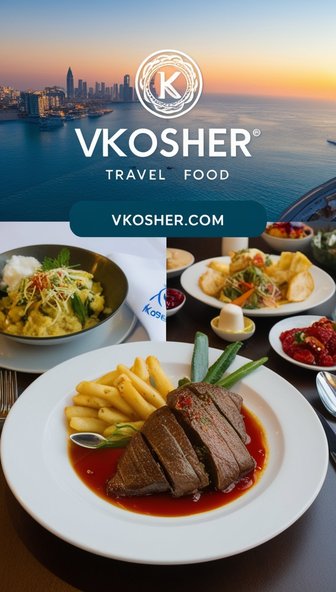Exploring the World of Kosher Charcuterie
Introduction to Kosher Charcuterie
Kosher charcuterie is a delightful and complex culinary tradition that combines the art of charcuterie with the strict dietary laws of kashrut. For many, charcuterie evokes images of rich, cured meats and flavorful cheeses, but for those who observe kosher dietary laws, the world of charcuterie takes on a unique and thoughtful dimension. Kosher charcuterie encompasses a range of carefully prepared and permissible foods that adhere to Jewish dietary laws while maintaining the rich flavors and presentation of traditional charcuterie.
The Foundations of Kosher Dietary Laws
To understand kosher charcuterie, one must first grasp the fundamentals of kosher dietary laws. These laws, rooted in the Torah and expounded upon in the Talmud, outline what foods are permissible and how they must be prepared. Key principles include the prohibition of mixing meat and dairy, the requirement for meat to come from kosher animals that have been slaughtered in a specific manner, and the avoidance of certain foods altogether. In addition to these, there are guidelines for ensuring that all equipment and utensils used in the preparation of kosher food are kosher as well.
Crafting Kosher Charcuterie
The process of creating kosher charcuterie begins with the selection of ingredients. Unlike traditional charcuterie, which may include a variety of meats and cured products, kosher charcuterie must be prepared using only kosher-certified ingredients. This means that the meats used are sourced from animals that are both kosher and slaughtered in accordance with Jewish laws. Additionally, all processing and curing must be conducted with equipment that is designated for kosher use to avoid cross-contamination with non-kosher products.
Kosher Meats and Their Preparation
In kosher charcuterie, the choice of meats is crucial. Common options include kosher beef, lamb, and poultry. These meats must be processed in accordance with kashrut, including the removal of certain fats and veins that are not permitted. The curing and seasoning of kosher meats involve a careful balance of flavors to enhance the natural qualities of the meat while adhering to kosher guidelines. Spices, herbs, and other flavorings used in kosher charcuterie must also be kosher-certified to ensure that the final product is fully compliant with dietary laws.
Varieties of Kosher Charcuterie
Kosher charcuterie offers a diverse range of products that cater to various tastes and preferences. One of the most popular options is kosher salami, which is crafted from finely ground beef or veal and seasoned with a blend of spices. Other examples include kosher bresaola, a dry-cured beef that is aged to develop a rich, concentrated flavor, and kosher pastrami, which is traditionally brined and smoked for a distinctive taste. Each of these products is made with attention to detail and a commitment to maintaining the integrity of kosher dietary laws.
Pairing Kosher Charcuterie
The art of pairing kosher charcuterie with complementary foods and beverages is an integral part of enjoying this culinary experience. Kosher charcuterie can be beautifully paired with a variety of kosher wines, which are produced under strict guidelines to ensure they meet the requirements of kashrut. Additionally, kosher cheeses, which are made from milk that comes from kosher animals and processed in a kosher environment, can complement the flavors of cured meats. Fruits, nuts, and bread are also excellent accompaniments, providing a well-rounded tasting experience.
The Role of Kosher Charcuterie in Jewish Traditions
Kosher charcuterie plays an important role in Jewish traditions, particularly in celebrations and festive occasions. Whether it’s a family gathering, a holiday meal, or a special event, kosher charcuterie adds a touch of sophistication and flavor to the table. It reflects a commitment to maintaining dietary laws while enjoying the pleasures of well-crafted food. The careful preparation and presentation of kosher charcuterie also highlight the importance of hospitality and the desire to offer guests high-quality, thoughtfully prepared food.
Innovations in Kosher Charcuterie
As interest in kosher charcuterie grows, so too do the innovations within the field. Contemporary chefs and producers are exploring new techniques and flavors to bring a modern twist to traditional kosher charcuterie. This includes experimenting with unique spice blends, alternative curing methods, and creative presentations. The goal is to enhance the kosher charcuterie experience while respecting the foundational principles of kashrut. These innovations help to keep kosher charcuterie exciting and relevant in today’s diverse culinary landscape.
Challenges in Producing Kosher Charcuterie
Producing kosher charcuterie presents several challenges, particularly due to the need to adhere to strict dietary laws. Ensuring that all ingredients and equipment are kosher-certified requires careful planning and coordination. Additionally, maintaining the high standards of quality and flavor while following these guidelines can be demanding. However, the dedication to upholding kosher principles while creating delicious charcuterie is a testament to the skill and passion of those involved in this craft.
Conclusion
Kosher charcuterie represents a fascinating intersection of tradition and innovation, combining the rich heritage of charcuterie with the meticulous requirements of kosher dietary laws. It offers a unique culinary experience that honors the principles of kashrut while celebrating the art of fine food. From the careful selection of ingredients to the artful presentation of finished products, kosher charcuterie exemplifies a commitment to quality and tradition. Whether enjoyed at a festive occasion or as part of a simple meal, kosher charcuterie stands as a testament to the rich diversity and depth of kosher cuisine.
Introduction to Kosher Charcuterie
Kosher charcuterie is a delightful and complex culinary tradition that combines the art of charcuterie with the strict dietary laws of kashrut. For many, charcuterie evokes images of rich, cured meats and flavorful cheeses, but for those who observe kosher dietary laws, the world of charcuterie takes on a unique and thoughtful dimension. Kosher charcuterie encompasses a range of carefully prepared and permissible foods that adhere to Jewish dietary laws while maintaining the rich flavors and presentation of traditional charcuterie.
The Foundations of Kosher Dietary Laws
To understand kosher charcuterie, one must first grasp the fundamentals of kosher dietary laws. These laws, rooted in the Torah and expounded upon in the Talmud, outline what foods are permissible and how they must be prepared. Key principles include the prohibition of mixing meat and dairy, the requirement for meat to come from kosher animals that have been slaughtered in a specific manner, and the avoidance of certain foods altogether. In addition to these, there are guidelines for ensuring that all equipment and utensils used in the preparation of kosher food are kosher as well.
Crafting Kosher Charcuterie
The process of creating kosher charcuterie begins with the selection of ingredients. Unlike traditional charcuterie, which may include a variety of meats and cured products, kosher charcuterie must be prepared using only kosher-certified ingredients. This means that the meats used are sourced from animals that are both kosher and slaughtered in accordance with Jewish laws. Additionally, all processing and curing must be conducted with equipment that is designated for kosher use to avoid cross-contamination with non-kosher products.
Kosher Meats and Their Preparation
In kosher charcuterie, the choice of meats is crucial. Common options include kosher beef, lamb, and poultry. These meats must be processed in accordance with kashrut, including the removal of certain fats and veins that are not permitted. The curing and seasoning of kosher meats involve a careful balance of flavors to enhance the natural qualities of the meat while adhering to kosher guidelines. Spices, herbs, and other flavorings used in kosher charcuterie must also be kosher-certified to ensure that the final product is fully compliant with dietary laws.
Varieties of Kosher Charcuterie
Kosher charcuterie offers a diverse range of products that cater to various tastes and preferences. One of the most popular options is kosher salami, which is crafted from finely ground beef or veal and seasoned with a blend of spices. Other examples include kosher bresaola, a dry-cured beef that is aged to develop a rich, concentrated flavor, and kosher pastrami, which is traditionally brined and smoked for a distinctive taste. Each of these products is made with attention to detail and a commitment to maintaining the integrity of kosher dietary laws.
Pairing Kosher Charcuterie
The art of pairing kosher charcuterie with complementary foods and beverages is an integral part of enjoying this culinary experience. Kosher charcuterie can be beautifully paired with a variety of kosher wines, which are produced under strict guidelines to ensure they meet the requirements of kashrut. Additionally, kosher cheeses, which are made from milk that comes from kosher animals and processed in a kosher environment, can complement the flavors of cured meats. Fruits, nuts, and bread are also excellent accompaniments, providing a well-rounded tasting experience.
The Role of Kosher Charcuterie in Jewish Traditions
Kosher charcuterie plays an important role in Jewish traditions, particularly in celebrations and festive occasions. Whether it’s a family gathering, a holiday meal, or a special event, kosher charcuterie adds a touch of sophistication and flavor to the table. It reflects a commitment to maintaining dietary laws while enjoying the pleasures of well-crafted food. The careful preparation and presentation of kosher charcuterie also highlight the importance of hospitality and the desire to offer guests high-quality, thoughtfully prepared food.
Innovations in Kosher Charcuterie
As interest in kosher charcuterie grows, so too do the innovations within the field. Contemporary chefs and producers are exploring new techniques and flavors to bring a modern twist to traditional kosher charcuterie. This includes experimenting with unique spice blends, alternative curing methods, and creative presentations. The goal is to enhance the kosher charcuterie experience while respecting the foundational principles of kashrut. These innovations help to keep kosher charcuterie exciting and relevant in today’s diverse culinary landscape.
Challenges in Producing Kosher Charcuterie
Producing kosher charcuterie presents several challenges, particularly due to the need to adhere to strict dietary laws. Ensuring that all ingredients and equipment are kosher-certified requires careful planning and coordination. Additionally, maintaining the high standards of quality and flavor while following these guidelines can be demanding. However, the dedication to upholding kosher principles while creating delicious charcuterie is a testament to the skill and passion of those involved in this craft.
Conclusion
Kosher charcuterie represents a fascinating intersection of tradition and innovation, combining the rich heritage of charcuterie with the meticulous requirements of kosher dietary laws. It offers a unique culinary experience that honors the principles of kashrut while celebrating the art of fine food. From the careful selection of ingredients to the artful presentation of finished products, kosher charcuterie exemplifies a commitment to quality and tradition. Whether enjoyed at a festive occasion or as part of a simple meal, kosher charcuterie stands as a testament to the rich diversity and depth of kosher cuisine.




